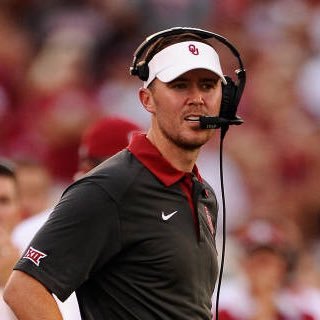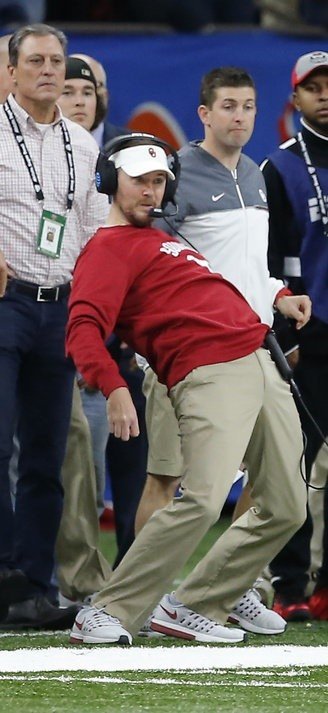 Lincoln Riley: What Has Been and What’s To Come
Posted on: May 17, 2017
Lincoln Riley: What Has Been and What’s To Come
Posted on: May 17, 2017
(Image via Lincoln Riley twitter)
Lincoln Riley runs good offenses and will continue to do so. Any questions? No? Good, my work here is done. Untie the horses, spit on the fire, let’s go home boys.
On a real note, there has been a lot of talk recently about Lincoln Riley: what he’s done so far, what he can do in the future, and what trajectory his career may follow. With that in mind, I wanted to dive in for myself and see what to think of the situation.
The Riley History Lesson
Lincoln Riley was born in 1983 as an 8 pound, 6 ounce, newborn infant Lubbockianite (A: Hopefully you caught that reference. B: I don’t know what someone from Lubbock is actually called, but this feels right). He walked on at Texas Tech in 2002, where Mike Leach quickly told him he would never play quarterback. Leach did, however, offer him the chance to become a student coach – Riley’s intelligence and feel for the game had caught the eye of the coaching staff. Riley had a passion for coaching, and accepted Leach’s offer.
He served the staff in this way for several years, then was made the receivers coach in 2007, at the young age of 23 years old. He was a wide receivers coach for three years at Tech. Under his tutelage, wide receiver Michael Crabtree won the Biletnikoff Award, after setting a whole host of records. Then, Mike Leach was fired toward the end of the 2009 football season; Riley stayed on to coach the offense for the Alamo Bowl and led the Red Raiders to 41 points and a win. Following the bowl game, Ruffin McNeill (then AHC at Texas Tech) took the head coaching job at East Carolina and brought the 26-year-old Riley with him to be his offensive coordinator.
Riley was the quarterback coach and offensive coordinator at ECU for five seasons, while adding the title of assistant head coach in his fifth year. While there, he coached several high profile offenses that routinely finished highly ranked in passing offense, scoring, and efficiency. Shane Carden was a highlight player; he was a 4,000 yard passer and led all FBS quarterbacks in completions in 2014. Justin Hardy was another; he broke the NCAA record for career receptions, a record previously held by OU’s own Ryan Broyles. Another Riley recruit, Zay Jones, broke the NCAA record while at ECU in 2016.
In January of 2015, after wholesale staffing changes, Bob Stoops brought on Lincoln Riley as Oklahoma’s quarterbacks coach and offensive coordinator. Riley was called to reinvigorate a Sooners offense and bring a fresh perspective to it. He did just that; the Sooners offense finished fourth in scoring and seventh in yards per game in 2015. Riley also coached the Sporting News National Player of the Year in Baker Mayfield. Despite coming from an Air Raid offense background, Riley was able to use a backfield consisting of Samaje Perine and Joe Mixon. He was rewarded with the Broyles Award, given annually to the nation’s top assistant. In 2016, OU finished first in passing efficiency and pass completion percentage, second in total offense, and third in scoring. Mayfield set the FBS record for passing efficiency, Dede Westbrook won the Biletnikoff Award, and two Sooners finished in the top five of the Heisman voting.
Toward the end of both seasons, particularly the 2016 one, Riley’s name was tied to several jobs. The Houston job was prominent among those, with an interview reportedly occurring. However, none of those opportunities panned out. Now, we’re halfway between seasons and Riley is on contract with Oklahoma for several more years.
Riley is very well liked at OU by players and staff. Former player Ty Darlington wrote a piece for TFB that was published in January on his opinion of the coach. If you missed it or want to reread it, check it out here – TFB: What’s So Great About Lincoln Riley?
The Extension
On May 11th, Sooner fans received some fantastic news: Riley was given a contract extension. It is a three-year contract worth $1.3 million annually and is the longest contract for an assistant in school history. For a reference point, $1.3 million would have been good for the 5th highest paid assistant coach in 2016. It will still be top 10 assistant coach pay, at least, in 2017.
Here to stay.@LincolnRiley's contract extended through 2019.
More ➡️ https://t.co/v5VVdglcGq pic.twitter.com/9CrAp0Tszx
— Oklahoma Football (@OU_Football) May 11, 2017
What does the extension indisputably mean?
There has been a lot of speculation on what this contract means. Already, words like “coach-in-waiting” and “successor” have been tossed around. For now, let’s focus only on things that are as certain as the fact that Kansas beat Texas in football.
1) Lincoln Riley is a hot commodity. He’s had several interviews and been looked at for several jobs. He’s been in charge of debatably the best offense in the country over the past two years and has had several high profile playmakers on the field. Oklahoma wanted to give him an assurance that they were invested in him.
2) The contract provides some measure of holding power on Riley. Along with the money, there is presumably some sort of buyout clause in the contract stating “if you take him, give us money.” (Yes, those are the technical terms). Would it stop someone like, say, Alabama or Ohio State from offering? Of course not. (They’re not going to offer. They’re happy with their current coaches. Please don’t take that as some weird speculation or subtle hint. Just trying to point to top programs around the nation.) They can pay for whoever they want. What it will do is put a stop to the mid-tier programs vying for his attention. In 2016, only about 50% of FBS schools (68 programs) paid their head coach over $1.3 million; many programs just can’t afford that kind of money. Additionally, the ones that can afford that would have to factor in whatever the additional buyout would be. Of those 68, many of them are quite happy with their head coach. Furthermore, many of those jobs would hardly hold the attention of someone as in demand as Riley (for example, nothing personal against the program, but Chris Ash’s $2 million at Rutgers just isn’t going to attract Riley). All of that to say, OU did a good job of limiting the number of opportunities Riley will realistically look at.
3) A more behind-the-scene piece of this puzzle, but a piece no less important, is the recruiting effect this will have. Not to be too negative, but OU had a rather rough month of recruiting in April. Some of the recruiting news fueled speculation that other teams were using Riley’s future status with the program as a tool against OU. David Boren was quoted after the extension as saying, “Why not let our competitors know that? They’re going around saying ‘Oh, they might not still have [Riley] if you go to OU.’ In the middle of recruiting season, why wait to let everyone know he’s coming back?” The University was clearly paying attention to the current recruiting climate, and wanted to put a stop to any adverse effects Riley’s uncertain future with the program could have.
4) For the moment, Riley is apparently quite happy staying at OU. He is enjoying growing as a coach and enjoying the program. Additionally, he is displaying wisdom in knowing that, at 33, he can wait for the right job. Some coaches jump at the first head coaching job they see: while that strategy works for some, for many it results in landing at a struggling program with little chance of winning and can be a huge setback in a career. Riley is waiting for the right moment, whatever moment that may be.
5) There is a rapidly increasing cost to get top level coaches. The Big 12 now has 2 assistant coaches over the $1 million mark (Riley and Texas’ Todd Orlando).
What does the extension not necessarily mean?
(It could mean these things – we just don’t know yet).
1) Lincoln Riley is not guaranteed to be coaching at OU for three more years. As stated above, if a top tier school were to want him and were willing to pay, and Riley were to want to go, it seems quite certain that could happen.
2) Bob Stoops is not necessarily retiring in 3 years. Is it possible he does so? Heck, it’s possible he retires tomorrow. All that is being said here is that, without more information, the contract does not guarantee Stoops has set any sort of retirement date.
What does the future hold for Mr. Riley?
I wish I knew this answer. I’ve been rolling this around in my head and discussing it with people for quite a while, even more frequently since the contract was announced. Several possibilities seem plausible, and really only time will tell. However, here are my general thoughts on some potential scenarios.
1) Biggest speculation for most Sooner fans: Is it possible there’s a behind-the-scenes understanding that Riley will take over when Bob Stoops is done?
a. For: I’m quite sure it’s possible. Stoops is 56 years old. He just bought another Chicago house and has two boys that are very close to finishing high school. Is he waiting for them to finish and then calling it quits? It’s in the realm of possibility. Stoops is knocking on the door of 20 seasons with OU; maybe he is waiting for 20 years and an empty nest before moving on.
b. Against: On the other hand, Stoops doesn’t seem to be slowing down at all; in fact, most Sooner fans would argue that he has seemed reinvigorated the past few years. The program has some great things going for it right now: new facilities, high profile playmakers, a great offense, and of course its long tradition of being a top program. Would Stoops be satisfied turning his back on that setup? Also, what if he wins a National Championship in the next few years? Would that make him satisfied with his coaching career, or would that make him hungry for more?
2) As a slight twist to Question 1, is it possible that OU wants Riley to stay on as an assistant coach for a few years, go take a head coaching job for a few years to get experience, and then come back to be a head coach at OU?
a. For: I think this is possible. Many top programs want to see a coach succeed at a smaller school before committing to him.
b. Against: However, I think this is less likely now that he is under contract for three years. If this were really the case, why not start that head coaching experience after next season (or this past season)? Again, this is possible, but much less likely now in my opinion.
3) If someone like Notre Dame, Ole Miss, Texas A&M, or UCLA – all of whom have coaches on the hot seat – came knocking after the 2017 season, could Lincoln Riley turn that down? I think that largely depends on the answer to Question 1.
a. For: If the answer to Question 1 is no, then jobs on this level would be incredibly difficult to turn down. While some jobs at this level are hard to succeed at, some of these jobs would be a dream job for most coaches.
b. Against: If the answer to Question 1 is yes, then no I do not think these jobs would attract him. Why jump to one of those if there is a promise of being the head coach at OU?
4) Is it possible that there’s no promise for the future and this is just an extension to lock up a talented coach?
a. For: Yes it is. A “head-coach-in-waiting” tag is a dangerous game to play – just ask Mack Brown and Will Muschamp. It can result in broken relationships, an air of expectations on the coaching staff, and a program waiting for the next thing instead of focusing on the present. Oklahoma may not want to go down that road, and may want to keep its options open; the same goes for Riley.
b. Against: It seems unlikely that Riley and Oklahoma aren’t thinking down the road at least a little, even if these other scenarios aren’t the exact truth.
Summary
Riley’s future holds a whole host of options, and we just don’t know how those will look yet. There are several possibilities, but also plenty of other options for how this situation may be resolved. For now, Sooner nation just needs to enjoy pumping out high octane offenses and appreciate Riley for the coach he is.
(Image via NewsOK.com)


